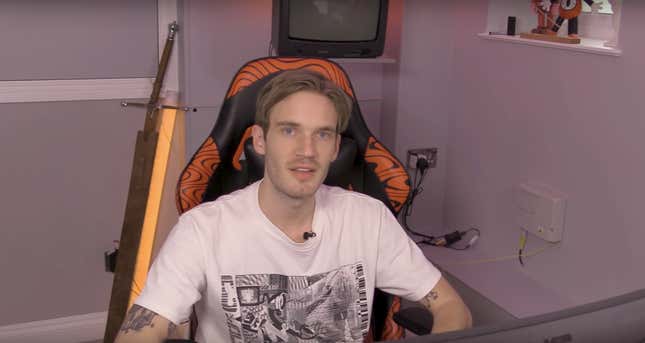
A profile of YouTuber Pewdiepie in the New York Times titled “What Does Pewdiepie Really Believe?” does not quite answer that question. In fact, Pewdiepie himself does not seem to know.
New York Times writer Kevin Roose spoke to Pewdiepie, nee Felix Kjellberg, in the aftermath of March’s shooting in Christchurch, New Zealand, where a shooter opened fired in a mosque after saying, “Remember, lads, subscribe to PewDiePie.” The conversation came about, Roose wrote yesterday, when Kjellberg’s publicist called him shortly after the shooting because Kjellberg wanted a chance to explain his views. Roose provided an example of what he calls one of their “futile exchanges.”
“Are there any politicians who excite you?”
“No.”
“Like, anywhere in the world?”
“I couldn’t name one, no.”
“What did you think about UKIP endorsing you?” I asked. On Twitter, the far-right British party had recently told its followers to subscribe to his channel to stop T-Series from overtaking him.
“It’s kind of funny how a political party would post about a meme,” he said. “But it’s also kind of like, Ehh, don’t drag me into your politics.”
This exchange makes clear that, while Kjellberg has Mr. Magoo’d himself into politically charged controversy after controversy, he does not seem to understand how to grapple with his level of fame and influence.
“My job is just: I go to my office; I record a video in front of a camera,” Kjellberg told Roose. “It’s weird for me to be in this position [of influence], because I don’t really want to be in this position.”
While this apathy toward politics might seem unlikely, I do find aspects of it relatable. I’m often completely oblivious to the one sided relationship that people all over the world have with me over social media. I write a lot of my tweets on the toilet—it feels bizarre whenever one of those missives is given any kind of weight or importance. While Kjellberg might have started his YouTube channel with the intention of just saying stuff on the internet, he’s no longer in the position where he can just let it sort itself out.
Though much of the article is more a reflection on YouTube culture as a whole and a recap of Kjellberg’s various controversies, near the end of the profile, Kjellberg speaks specifically about his ambivalent attitude towards his channel.
Roose asked Kjellberg if he’d ever delete his YouTube channel. “Don’t tempt me,” Kjellberg answered. “I kind of question if the positive outweighs the negative…. It’s a lot more than I think I signed up for.” He clarified to Roose that he wouldn’t do so. “Deleting his channel is not something he would really go through with,” Roose wrote. “Like many other extreme ideas, it’s just something he plays with from time to time.”